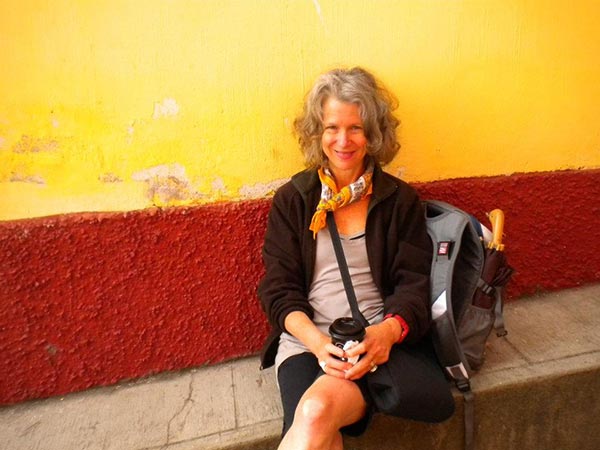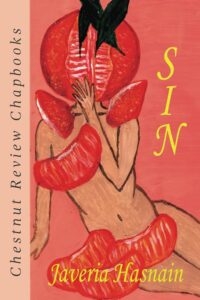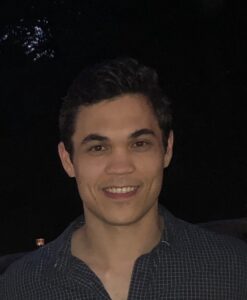The Wild Feminine: Five poems by Ada Limón
by Dion O’Reilly
October 29, 2019
In the Christian myth, Adam names the animals. In “A Name,” the first poem of Ada Limón’s most recent collection, The Carrying, she remakes Eden. In Limón’s version, Eve names the creatures, making one wonder if in this Genesis, Eve is the first-born human, the maker of Adam.
When Eve walked among
the animals and named them—
nightingale, red-shouldered hawk,
fiddler crab, fallow deer—
I wonder if she ever wanted
them to speak back, looked into
their wide wonderful eyes and
whispered, Name me, Name me.
“A Name,” sets a high bar for the The Carrying by rewriting the Judeo-Christian narrative, claiming the woman as Namer. Moreover, the speaker wonders if the original woman “looked into/their wide wonderful eyes/ and whispered, Name me Name me.” This re-imagining not only transfers the power to Eve, but also shows how differently a woman might claim the world: not as an object on which to impose meaning, but rather as a source of meaning and identity. This poem, which turns Christian ideology on its head, is not heavy-handed in its feminist slant. It is not resolute, does not chant a received wisdom. It is important to note that the speaker “wonders” if Eve “wanted” the animals to “speak back.” Limón poses a question. Indeed, her question is rather magical and not a little plaintive. We sense the desire for this female bond with the wild. We allow that her need might be enough to inspire such a bond, while the repetition — Name me, Name me— implies an unfulfilled longing.
This feminine ability to derive power from animals is unabashedly clear in the opening poem of Bright Dead Things. The Pushcart winner, “How to Triumph Like a Girl,” is a playful celebration of womanhood. The first line is disarming, initially characterizing the mares un-feministically as “lady horses”— ladylike and prancy, not at all your stereotypical leaders.
I like the lady horses best,
how they make it all look easy,
like running 40 miles per hour
is as fun as taking a nap, or grass.
I like their lady horse swagger,
after winning. ears up, girls. ears up!
but mainly, let’s be honest, I like
that they’re ladies. As if this big
dangerous animal is also a part of me,
Summer inside the delicate
skin of my body, there pumps
an 8-pound female horse heart,
giant with power, heavy with blood.
Don’t you want to believe it?
Don’t you want to lift my shirt and see
the huge beating genius machine
that thinks, no, it knows,
it’s going to come in first.
As the poem moves along, we begin to discern the power of these “lady horses.” They have “swagger, after winning.” Then the weird and fascinating turn; the speaker feels an identification with the beasts because of their shared gender. Once again, the poem’s second volta asks a question: “Don’t you want to believe it?/Don’t you want to lift my shirt and see/the huge beating genius machine/that thinks, no, it knows,/it’s going to come in first.” This poem is a fun “Imagine” song, a kind of “I have a dream” manifesto, but with a subtle stratum. Limón’s speaker doesn’t ask the reader to believe a woman can be as powerful as a racehorse; she asks the reader if she might “want to believe it”— a nudge, a baby step. Furthermore the question is framed in a transgressive manner, asking if the narrator could reveal her breasts (the source of human nurturance and nutrition) and instead of an offense or party prank, it might be proof of power and “genius.” Moreover, consider how she imparts “genius” to the heart, the organ conventionally associated with feelings— as if to imply feelings are possessed of their own intuitive knowledge.
In the April 2019 Writer’s Chronicle interview, Limón remarks that “there are two snakes in a poem, and in the end, one snake has to win…on some level one of the many underlying forces of the poem has to prevail…People are scared to make a choice or they feel like they want to embrace the mess and craziness of it, which is awesome, but in doing so sometimes they dilute [the ending of the poem].” In much of Limón’s work, it is the feminine wild that prevails. Many of her poems deal with loss— death of the planet, death of family members, death of the conventional dream of being a mother. That “snake” of loss is often entwined with the competing snake of wild femaleness or with the pure beauty of the natural world. Inevitably the feral feminine wins. The choice is made. Sometimes, it is purely nature that prevails, but there are enough poems like the ones cited above to establish a strong connection between the feminine and the wild as a balm.
Take “Service,” from Bright Dead Things, in which the speaker is “fed up” with her traveling companion whom we take to be her boyfriend or husband: the speaker is not enjoying his objectification of his ex-girlfriend’s beauty. The speaker re-establishes her resonance with the physicality of a racehorse and then sets out to find her satisfaction in yet another animalistic bond:
Somewhere outside of Albuquerque, I was all
fed up with the stories about your ex girlfriend’s
Guess billboard in New York City, and to make
matters worse, I had to pee like a racehorse, or
like a girl who’d had too much to drink way
too far away from home. You stopped at a friend’s
body shop to talk about a buddy who was stuck
some place in Mexico. You were talking, pulling
strings and taking pulls off a brown bottle, and no
one told me where the restroom was, so I walked
back to where the hot rods were displayed like dogs
ready for a fight, baring their grills like teeth.
I was hungry, the air smelled like hot gasoline
and that sweet carnation smell of oil and coolant.
A girl pitbull came and circled me as I circled
the cars; she sniffed my ankles like I was her kin
or on some kind of rescue mission. You were still
talking, not a glance in the direction of me
and the bitch working our ways around
the souped-up Corvettes and the power tools.
The pet was glossy, well cared for, a queen
of the car shop, and when she widened
her hind legs and squatted to pee all over
one of the cars’ dropped canvases. I took it
as a challenge. That strong yellow stream seemed
to be saying, Girl, no one’s going to tell me
when to take a leak, when to bow down,
when not to bite. So, right then, in the dim lights
of the strange garage, I lifted my skirt and pissed
like the hard bitch I was.
Again, Limón is asking a question: Why are females dismissed and ignored— relegated to the junk heap. Why is the term bitch derogatory when female dogs are loyal, protective, smart, and strong— like “a queen?” The speaker feels marginalized and ignored until she identifies with the powerful pitbull bitch and transgressively defines her territory by pissing in the junk. The speaker is far from home in an environment that is not helpful or friendly. The snake of oppression and alienation is conquered by the snake of animalistic female empowerment. Limón makes a clear (and humorous) choice, claiming to be a “hard bitch,’ and that’s why the resolution is so strong.
In The Carrying, Limón grapples with her fruitless attempts to conceive and what that means for a woman. In the final analysis, nature reconciles the speaker’s ambivalence and mediates the loss. In the last poem “Sparrow, What Did You Say?,” the narrator— who has spent a quiet day gardening— contemplates what her life would be like if she were capable of giving birth. She decides “I’m good at this, this being alone/in the world, the watching of things/growing, this older me…who spent an hour trying to figure out that the bird/with a three-note descending call/is just a sparrow.” She goes on to question what her life would be like if she had a child, would she “selfishly demand this day/back, a full untethered day trying/to figure out what bird was calling me/and why.” As usual, Limón asks the question without imposing an answer. It is clear the path for this speaker is to listen to the wild and pursue what she hears. This poem is not only a tribute to the redemptive power of nature, but also an ars poetica. The speaker, in the final analysis, re-dedicates herself to listening to the natural world and figuring out what to say about it. That process becomes her generative act.
Sometimes, without reference to distinctly feminist issues, the untouched landscape releases the living from pain or bondage. In “The Long Ride,” a doomed horse is a stand-in for the universal anguish of misdeeds and regret. The horse is identified with civilization, the city, and its discontents. The open pastures of Montana become the balm for human sin.
Ma’s in the wind-pummeled double-wide
waiting for the retired policeman
to bring the retired police horses
to the ranch. She’s at the window now
describing the rain, the two-horse trailer,
and also, how sometimes she and my stepdad
talk about death for a long time.
How imagining death can make it easier
to live and I agree and say, It’s called die
before you die. What is being delivered
here is a horse who’s had a hard life.
A large quarter horse named Seattle—
a horse with a city-name who protected a city,
who was spooked outside the baseball stadium
what a shopping bag wrapped around his leg,
a plastic thing versus a muscle-bound animal
in a busy crowd and a flash accident killed
a man. But then, I wonder, what for the horse?
Never to be ridden, stuck numb in a stall,
lightning bugs torturing the poor blood?
I bet that horse might have wanted to
died before he died. But not yet.
What is what is being delivered here is release.
Today, his officer writer is finally retired too,
with an old badge on the dashboard
and a fine plan to drive all the way to Montana,
where the writer has bought a ranch for his horse,
Seattle. The rider and his horse, with his city name,
and his forgiven city mistakes, are charting
a clear new territory of absolution, and it makes
Ma and me happy. How good it is to love
live things, even when what they’ve done
is terrible, how much we each want to be
the pure exonerated creature, to be turned loose
into our own wide open without a single
harness of sin to stop us.
The wild and the love of the wild prevail in this poem as they do in most of Limón’s work. Characteristically, there is no minimizing of earthly pain and suffering; pain is a strong, vivid, writhing snake throughout, but ultimately, healing imagery of the “wide open” end the poems with satisfaction. Limón chooses the snake of love, redemption, and the natural order.
On her Blogspot, Limón states “I think it might be harder for men to talk about their feelings, but when they do, we think they are being brave.” She goes on to discuss what it was like for her to be frank about her feelings:
I wasn’t just anxious. I was white-knuckling-for-the-take-off scared. For me, [Bright Dead Things] is the most personal book of poems yet. It’s raw in a way that I’m not used to; I don’t mean unfinished, I mean, “open.” Though the previous books of poems are certainly me, and expose all parts of me within them, this one doesn’t hide under anything. For starters, the poems never (or very rarely) change tense [sic]—the “I” in these poems is “ME.” I remember, while I was writing some of these poems, saying to myself, “Okay, what’s the poem you are scared to write?” and then trying to write it. I did this over and over again.
I would contend that Limón’s resolute commitment to choosing her snakes— revealing her feelings about loss, pain, womanhood, and nature— is a courageous choice, a revealing and vulnerable choice. Maybe, ultimately that’s what makes her poems both strongly female and also strong: she evinces the courage to open up, to deliver wildly-honest poems— to take a tough stand with finesse and craft, to be the “hard bitch” that she is and own it.
Works Cited
Buckton, Lisa. “Naming the Animal: Am Interview with Ada Limon.” The Writer’s Chronicle, vol. 51, no. 5, Apr. 2019, pp. 16-24.
Limon, Ada. The Carrying: Poems. Milkweed Editions, 2020.
Limón, Ada “Starting with A: On Art & Anxiety” Ada Limón. www. Adalimon.blogspot.com. Accessed 11 March 2019
Limón Ada. Bright Dead Things. Milkweed Editions, 2015.
The Holy Bible: King James Version. Dallas, TX: Brown Books Publishing, 2004.
ABOUT THE AUTHOR
Dion O’Reilly has spent much of her life on a farm in the Santa Cruz Mountains. Her poetry appears or is forthcoming in New Ohio Review, Sugar House Review, Rattle, The Sun, Massachusetts Review, New Letters, Bellingham Review, Atlanta Review, Catamaran, and a variety of other literary journals and anthologies, including an upcoming Lambda Literary Anthology. Her work has been nominated for Pushcarts, the Intro Journals Project, and was sent to the judges for the Folio Literary Journal Poetry Contest and her first manuscript, Ghost Dog, was a finalist for the Catamaran Book Prize.






